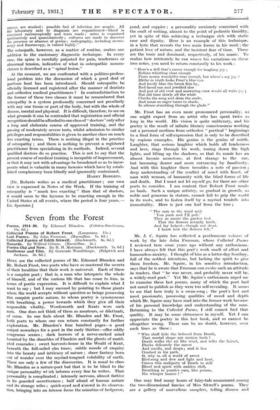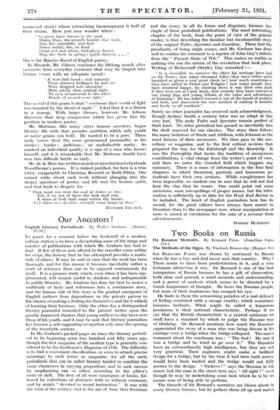Seven from the Forest
HERE are the collected poems of Mr. Edmund Blunden and Mr. Robert Frost, two poets who have so mastered the secrets of their localities that their work is universal. Each of these is a complete poet ; that is, a man who interprets the whole
of himself, and of the various life that has come to him, in terms of poetic expression. It is difficult to explain what I
want to say ; but I may succeed by pointing to those giants whom the world accepts without question as beings possessing this complete poetic nature, to whom poetry is synonymous with breathing, a power towards which they give all their responsible vitality. Wordsworth and Keats were such men. One does not think of them as amateurs, or dilettanti, of verse. So one feels about Mr. Blunden and Mr. Frost,
both poets to whom one can return constantly for further exploration. Mr. Blunden's four hundred pages—a good output nowadays for a poet in the early thirties—offer oddly congruous scenes ; dark horrors of a nerve-racked mind haunted by the shambles of Flanders and the ghosts of mutil- ated comrades ; sweet harvests-home in the Weald of Kent, beneath the full-sailed elm trees; subtle moods of enquiry into the beauty and intricacy of nature ; sheer fantasy born out of wonder over the myriad-tongued volubility of earth. These are only a few of the discoveries. It is usual to class Mr. Blunden as a nature-poet but that is to be blind to the unique personality svl ich informs every line he writes. That personality is complicated ; intensely nervous, almost furtive in its guarded secretiveness ; half afraid of human nature and its strange wiles ; quick-eyed and s'arewd in its observa- tion, bringing into an intense focus the minutiae of hedgerow, pond, and coppice ; a personality anxiously concerned with the craft of writing, almost to the point of pedantic timidity, yet in spite of this achieving a technique rich with static ease and dignity. Here is an example of this technique, in a lyric that reveals the two main forces in his work ; the patient love of nature, and the insistent fear of time. These
are the tonic and dominant, respectively, of his music. To realize how intricately he can weave his variations on these two notes, you need to return constantly to his work :
" Here's a dell that's sunny enough for laughing joy ; Robins whistling clear enough From mossy woodpiles near enough, but where's my joy ? Blithe in truth looks Frost's blue eye And lovely blue the brook flits by, Red-faced sun and jewelled sloe
And jest of old crow and answering crow would all wake joy ;
But old time slowly all the while Checks the song and dims the smile, And sense so eager turns to shade, In silence stumbling through the glade."
Mr. Frost has an even more pronounced personality, as one might expect from an artist who has spent twice as long in the world. His vision is quite unliterary, and his poetry is the result of infinite literary consciousness working out a personal medium from orthodox " poetical" beginnings to a final form of self-expression that is only to be described by copious examples. His genius is the genius of mirth. Laughter, that serious laughter which holds all tenderness and love, rings through his work, toning down the high lights, and lifting up the shadows, so that its music has an almost laconic monotone, at first strange to the ear, but becoming dearer and more entrancing by familiarity. And with this laughter there trembles a note of passion ; deep understanding of the conflict of mind with heart, of man with woman, of humanity with the blind forces of life and death. But I must not let myself go, for there are other poets to consider. I am content that Robert Frost needs no bush. Such a unique artistry, so gradual in growth, so noble and generous in stature, cannot fail to grip the world in its roots, and to fasten itself by a myriad tendrils into immortality. Here is just one leaf from the tree :
" The rain to the wind said
' You push and I'll pelt.'
They so smote the garden bed That the flowers actually knelt, And lay lodged—though not dead.
I know how the flowers felt."
Mr. J. C. Squire has collected a posthumous volume of work by the late John Freeman, whose Collected Poems I reviewed here some years ago without any enthusiasm. I have always felt that this poet's work smelt of effort and humourless anxiety. I thought of him as a latter-day Southey,
full of the noblest intentions, but lacking the spirit to give them freedom. Mr. Squire, in his sensitive introduction, says that he is aware that Freeman can evoke such an attitude in readers, that " he was never, and probably never will be, a widely-read poet." Yet Mr. Squire's enthusiasm urged me to examine these last poems, many of which the poet had not cared to publish as they were too self-revealing. It seems to me that here truly is a swan-song ; the poet's last and most passionate, possessing qualities of mood and depth
which Mr. Squire may have read into the former work because of his personal knowledge and understanding of the man. Returning to the Collected Poems, I still cannot find that
quality. It may be some obtuseness in myself. Yet I can appreciate the poetry in this last book, and so cannot be altogether wrong. There can be no doubt, however, over such lines as these :
" Who shall hide the beloved from Death,
That mortal shape nor motion hath ?
Death walks the air like wind, and wilts the fairest, Plucks delicately the rarest And smells, and drops ; and it lies Crushed in his path. 0, why in all a world of sweet Bird-song and dew and light and heat, Comes this malignity of Death to still Blood and spirit with sudden chill, Breathing in youth's ears, like poison, His whisper hoarse ? "
One may find many hours of fairy-tale amusement among the two-dimensional fancies of Miss Sitwell's poems. They are a gallery of marvellous samplers, telling diverse and mannered stories whose astonishing inconsequence is half of their charm. Here you may wander where :
" In green baize forests in the park Hunts Dian, doe-smooth hounds that bark, Run like waterfalls, and find Never rabbit, doe, or hind. Great red and white, bird-glossy flowers Sing like birds in spring's quick showers.
She is the Maurice Ravel of English poetry.
In Hazards, Mr. Gibson continues his lifelong search after moments from everyday existence that may be shaped into benign verses with an adequate moral : " A wire had fused ; and instantly From sheerest brilliance he and she Were dropped into obscurity More pitchy than original night To eyes accustomed to the white Dazzle of incandescent light."
The moral of this poem is that " evermore their world of light was haunted by the dread of night." I feel that it is a drama in a teacup. With larger themes, however, Mr. Gibson discovers that deep compassion which has given him his position in modern poetry.
Mr. Mottram, like many other famous novelists, began literary life with that prouder ambition which only youth or naive genius can hold. He wanted to be a poet. These early verses show the same pronounced personality as his stories ; tender ; judicious ; an unshakeable sanity. So marked an individual quality is a sign of a man who knows himself, and it is remarkable that Mr. Mottram should have won this difficult battle so early.
Mr. de in Mare has written an ardent introduction to Gertrude Woodthorpe's poems. It is indeed justified, for here is a true artist, comparable to Christina Rossetti or Ruth Pitter. One cannot write about such work without plunging into the deeper questions of poetry and life and the human spirit, and that leads to despair, for
" Thou cant not read the soul of flower or tree.
Yet, if on one of these thy look shall rest, A wave of God shall surge within thy breast, And thine own desolate strength come home to thee."
11 RICHARD Cnunen.












































 Previous page
Previous page